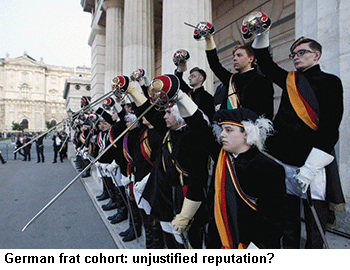 A stuffed fox stares down at a group of about 20 smartly suited men, the majority well into retirement age, drinking beer and chatting in the wood-paneled front room of a grand Berlin house. Every so often, a man wearing enormous white gloves, a plumed hat and a fencing-style sword by his side calls for silence and leads the group in another traditional German sing-along. Freedom, camaraderie and the fatherland are common themes. The fox and most of the men are wearing red, black and silver sashes, the colours of the Berliner Burschenschaft Germania, a German student fraternity celebrating its 155th anniversary.
A stuffed fox stares down at a group of about 20 smartly suited men, the majority well into retirement age, drinking beer and chatting in the wood-paneled front room of a grand Berlin house. Every so often, a man wearing enormous white gloves, a plumed hat and a fencing-style sword by his side calls for silence and leads the group in another traditional German sing-along. Freedom, camaraderie and the fatherland are common themes. The fox and most of the men are wearing red, black and silver sashes, the colours of the Berliner Burschenschaft Germania, a German student fraternity celebrating its 155th anniversary.
It is one of about 2,000 fraternities throughout Germany; the history of the groups stretches back to the 19th century, when many were set up to push for national unification. But as the preponderance of silver-haired former students in the room shows, this fraternity has struggled to recruit. Nationally, just 2 to 3 percent of students are now members, down from 30 percent in the 1950s, according to Deutsche Welle, Germany’s public international broadcaster. Many Germans perceive them as stuffy, boozy dens of nationalism — or even the far Right.
Every few years, a new scandal seems to blow up. In 2012, one Bonn-based fraternity proposed a rule change so that only students of “German descent” could join, after another fraternity admitted a member with Chinese parents.
Times Higher Education’s host, Dominik Lehmann, is keen to show this reputation is unjustified. He joined as a student for the sense of camaraderie, the exchange of “knowledge and experience” between young and old, and because of a “keen interest in German history and traditions.”
The fraternity certainly has some curious customs. New members must duel — twice — using fencing swords and only eye protection. But not all fraternities require new members to fence, but for those that do, it does rather “thin the crowd” of potential new recruits, he acknowledges. New recruits also take an oral exam, assessed by other members, on 19th and 20th-century German history. Of course, they must hold German citizenship — and be a male.
Why are they sometimes rather backward-looking? Since German unification, fraternities have “lost their common greater goal and are struggling to find a new cause to support”, explains Lehmann.
But there are definitely a few moments during the evening that would make some feel uncomfortable. At the end of the evening, the room stands to sing Das Lied der Deutschen, the basis for the current German national anthem, belting out its controversial lyrics Deutschland, Deutschland uber alles (“Germany above all”), which were stripped from the official anthem after the Nazi period.
The explanation given is that the song is a historical artifact, written in the mid-19th century about German unity, not conquest. But other fraternities have stopped singing the lyrics. Marc-Oliver Schach, a spokesman for the national fraternity association Neue Deutsche Burschenschaft (NeueDB), whose founding fraternities broke away from one of the main umbrella organisations in 1996 after it became too right-wing, said that the song sends out the “wrong message,” but some fraternities “cling” to it because it’s seen as an important tradition.
Struggling to recruit, Lehmann’s fraternity is now pondering a move away from Berlin to somewhere more fruitful. But still, these groups soldier on, giving a subset of students an experience their universities cannot offer.
(Excerpted and adapted from The Economist and Times Higher Education)























